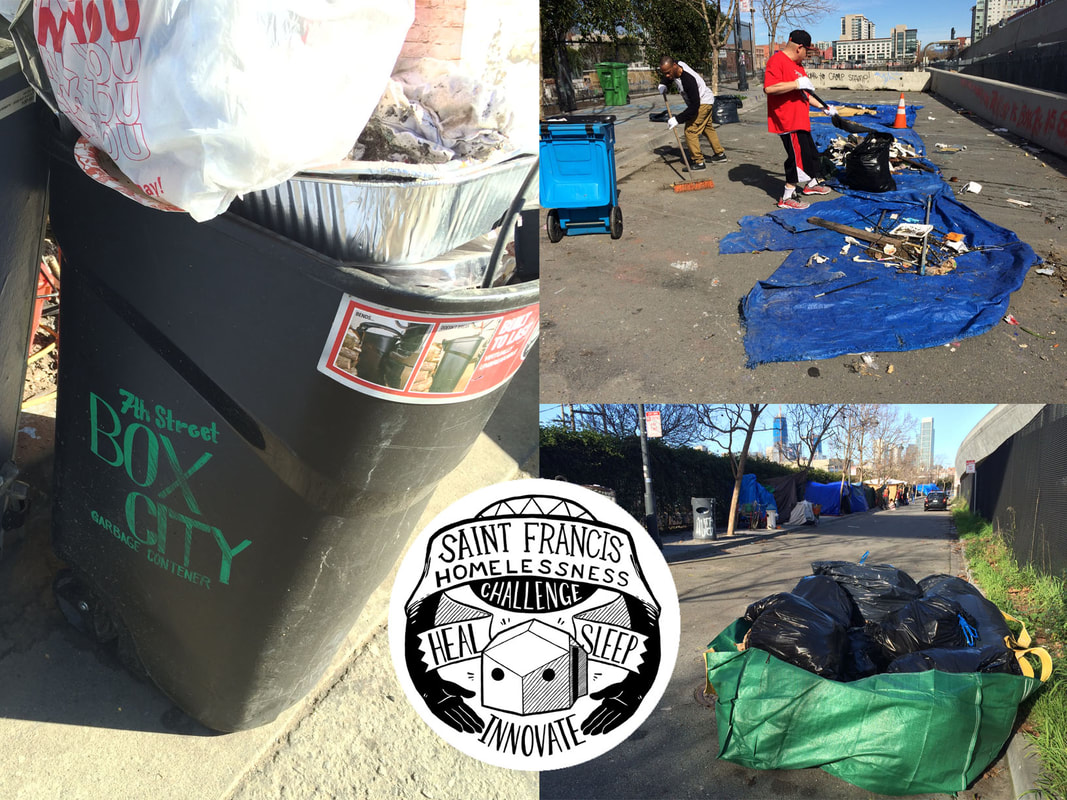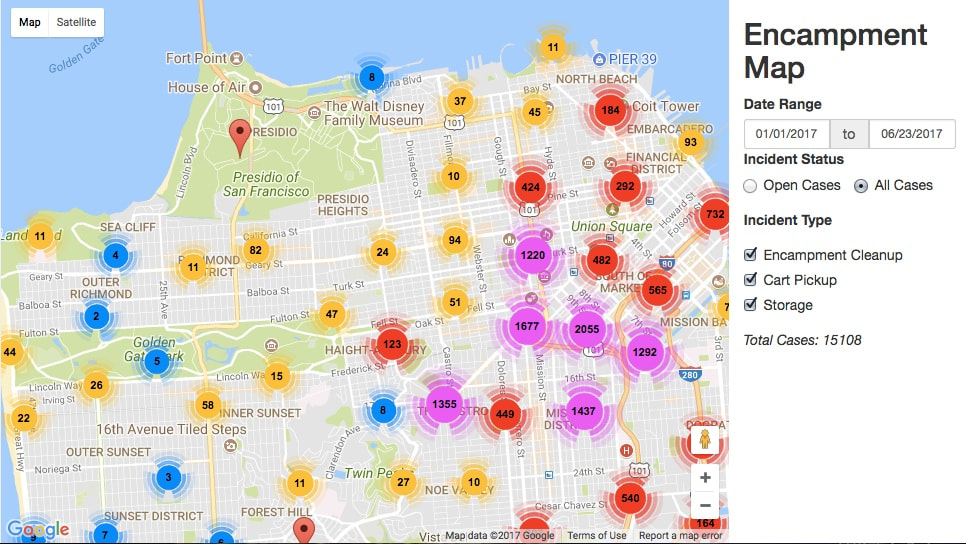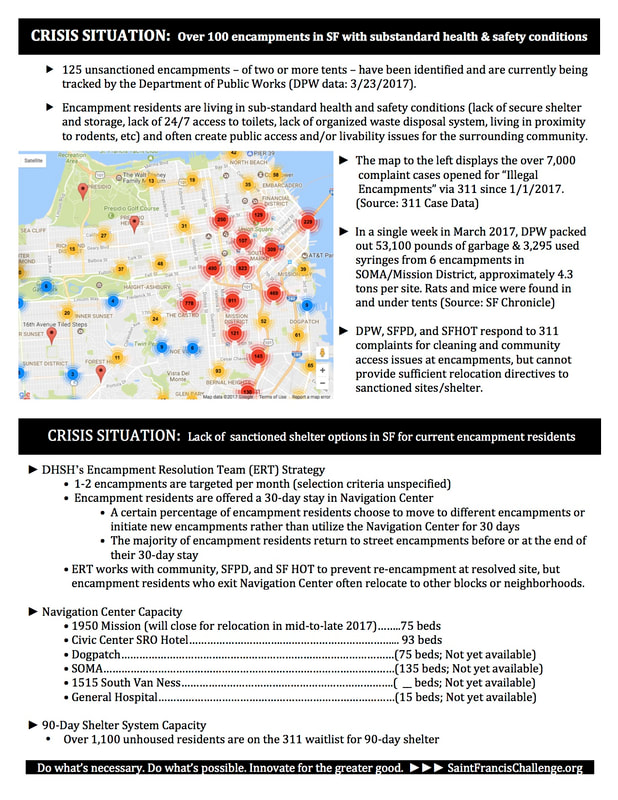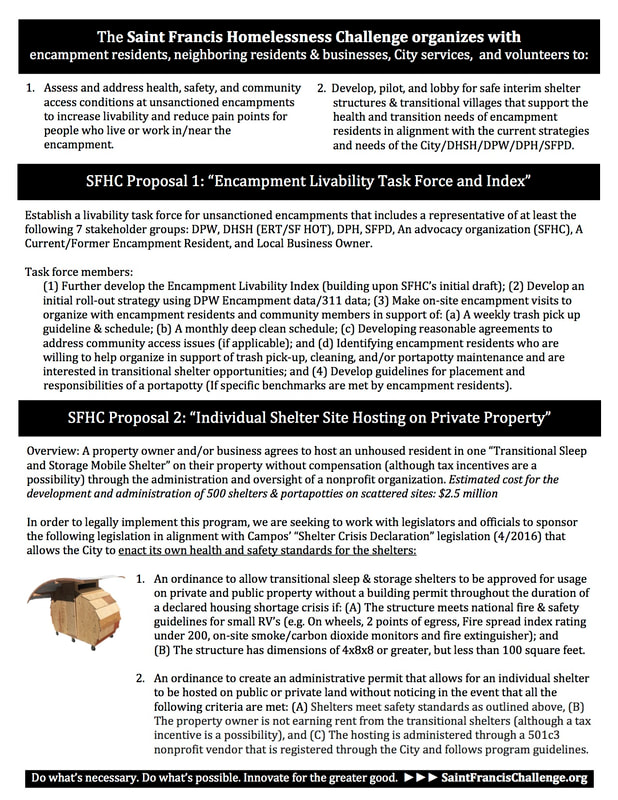Encampment Livability Index + Task Force
San Francisco needs an inter-departmental approach that organizes with encampment residents, advocates, and volunteers to assess and address encampment conditions in support of transition and community well-being. This effort should be co-led by DHSH, DPW, DPH, and coordinated with advocates (including SFHC and CoH), encampment residents, local businesses, and neighbors.
View Saint Francis Challenge's up-to-date map of 311 cases regarding neighborhood encampments.
Join Saint Francis Challenge in developing and promoting an "Encampment Livability Index"
Review and Comment on the current draft of the Encampment Livability Index.
According to the Department of Public Works, there are approximately 125 encampments that have been identified and are being tracked and serviced to some extent by DPW workers. 100% of those encampments need resources & organizing support for secure sleep, safe storage, sanitation, waste disposal, and pathways to transition in the midst of our ongoing shelter and affordable housing shortage crisis. Saint Francis Challenge is in the beginning stages of developing a tool that will enable us to humanely and collaboratively assess and address health, sanitation, safety, and livability issues at encampments ... and we'd love your participation in the development and piloting stages.
We will be including 311 Data (the map above is populated with 311 complaint cases about "Illegal Encampments" opened since January 1, 2017), DPW Data, Public Health Standards, as well as developing a system to identify and track issues and conditions for encampment residents, neighbors, and City workers. Until local government joins our efforts and follows the lead of Seattle and San Jose to develop additional sanctioned shelter sites via transitional villages on underutilized land, we must acknowledge and address the fact that fellow human beings and SF residents are living in substandard health and safety conditions on our streets. We must co-create reasonable agreements support harmony within the encampment, between encampment residents and their surrounding neighbors, and between encampment residents and City services.
This is not about being punitive or having a one-size-fits-all approach. This is about doing what is necessary and possible to address a current crisis with the resources that are available to us. This is about organizing WITH encampment residents and the community to increase accountability in both directions in a way that sets everyone up for successful co-existence and transition.
According to the Department of Public Works, there are approximately 125 encampments that have been identified and are being tracked and serviced to some extent by DPW workers. 100% of those encampments need resources & organizing support for secure sleep, safe storage, sanitation, waste disposal, and pathways to transition in the midst of our ongoing shelter and affordable housing shortage crisis. Saint Francis Challenge is in the beginning stages of developing a tool that will enable us to humanely and collaboratively assess and address health, sanitation, safety, and livability issues at encampments ... and we'd love your participation in the development and piloting stages.
We will be including 311 Data (the map above is populated with 311 complaint cases about "Illegal Encampments" opened since January 1, 2017), DPW Data, Public Health Standards, as well as developing a system to identify and track issues and conditions for encampment residents, neighbors, and City workers. Until local government joins our efforts and follows the lead of Seattle and San Jose to develop additional sanctioned shelter sites via transitional villages on underutilized land, we must acknowledge and address the fact that fellow human beings and SF residents are living in substandard health and safety conditions on our streets. We must co-create reasonable agreements support harmony within the encampment, between encampment residents and their surrounding neighbors, and between encampment residents and City services.
This is not about being punitive or having a one-size-fits-all approach. This is about doing what is necessary and possible to address a current crisis with the resources that are available to us. This is about organizing WITH encampment residents and the community to increase accountability in both directions in a way that sets everyone up for successful co-existence and transition.



